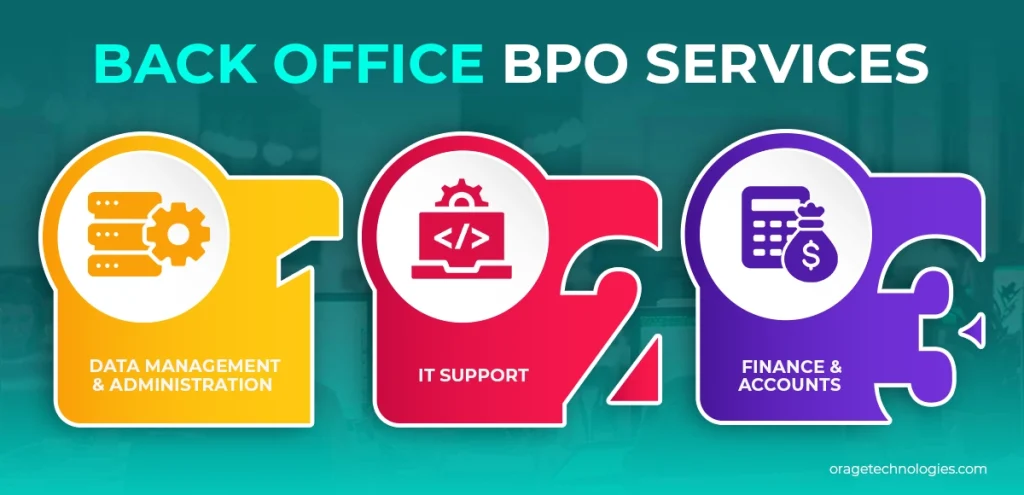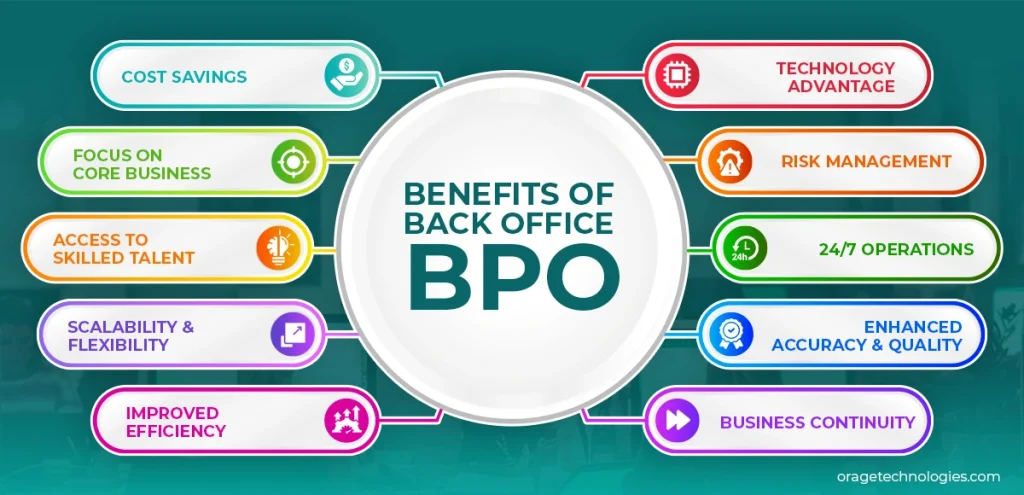
Arjun Seth has spent over 15 years working in the world of business, sales and operations. Having worked closely with teams at every level, he...
Front Office BPO is one of the most well known types of BPO involving customer handling. But do you know that BPO handles many things beyond customer handling. Other services can be data management, IT Support, Finance, HR etc. And when companies hand over these kinds of tasks to service providers, it is called Back Office BPO.
The previous blog might have given you the complete overview of front office BPO, this will give you insight how BACK OFFICE BPO works and what are the key benefits of outsourcing it.
What is Back Office BPO (Business Process Outsourcing)
Business Process Outsourcing simply refers to a business model where one company outsources its one kind of task to the service provider. It is of various types and one of them is Back Office BPO. It is generally described as the outsourcing of the non-core activities which does not directly assist in the financial or strategic objectives of the organizations. These tasks play a pivotal role in the internal operations but are not associated with the customers. The administrative or support functions for example – accounting, data entry, payroll, IT support etc. And some of the industries that commonly avail this are – telecommunications, healthcare and real estate further some govt. & semi govt. agencies also outsource the same.
Back Office BPO Services

Let’s look at some of the common services that come under the Back Office BPO:
Data Management and Administration
It is delegation of administrative tasks that are most likely related with data handling including manual or automated data entry, form processing, claims etc. further relates to collecting and organizing data ethically with data security. Moreover, it provides the structured and seamless support to the front-end team to operate seamlessly and lifts companies focus, time and energy towards strategic initiatives and long-term goals.
IT Support
The framework that allocates the non-client facing IT functions to the specialized service provider who majorly assists remotely by figuring out the technical issues with software, ensures that the hardware functions properly and also take care of the network infrastructure by implementing data protection and recovery procedures. The service provider workflow is managed and controlled by implementing ticket management systems by activating level 1 or level 2 resolving or escalation matrix.
Finance & Accounts
The outsourcing of company’s non-core financial and accounting workload to specialist and technology driven service providers who ensure compliance and financial regulations are checked and verified before preparing financial reports etc., it’s the blend that involves accounts payable, receivables, budgeting, forecasting, filing and preparing of audit reports.
Benefits of Back Office BPO

The involved organizations, whether its delegating company or the service provider are valuable to each other and the assistance of the services can be deputed onshore or offshore, depends upon the company and service provider requirements and experience.
To The Company
The outsourcing of the back-office tasks are much cheaper than performing the same in house, it saves overhead costs like salaries, infrastructure and equipment cost. The estimated reduction in costs accounts to 20% to 25% in onshore outsourcing and offshore helps to reduce it by 40% to 60% depending upon the region, location and complexity of delegated tasks.
It gets the specialized talent pool which standardize the workflow and improves accuracy of the assigned process. Scalability can be increased or decreased according to the business needs i.e., seasonal demand or expansion moreover the companies avoid operational and compliance risks further the backup systems help in disaster recovery plans.
To The Service Provider
The timely and required outputs delivery enhances the credibility of the service provider which leads to multi-year collaboration and results in regular predictable revenue generation along with business progression, versatile and flexible approach facilitates expansion by diversifying the business portfolio e.g., F&A, HR, etc. which ultimately increases all assets ROI.
The long-term association and good conduct attract new business referrals. The offshore service providers also get the advantage of currency exchange and gets global creditability and onshore service providers can easily gain the contracts as the faster implementation of the process takes place with few errors that can be handled on time as per regulations.
Revenue Generation Model in Back Office BPO
Back Office BPO is a profitable business model for both the company as well as the service provider. Let’s look at it through the lenses of monetary benefits:
Company
The revenue generation can be attained through financial and operational benefits which is ultimately linked with profitability, considerable amount is saved as the workforce cost is reduced. Manpower costs is reduced by approximately 30% to 35% in case of onshore outsourcing and on the other side in offshore outsourcing the same cost is likely to be down by 50% to 60% and the accounting of IT development and infrastructural costs save 65% to 70% depending upon the location and complexity of the delegated work, further hiring, learning & development cost accounts the highest savings as both the tasks are the responsibility service provider.
Outsourcing has some positive intangible benefits, the internal leadership people can focus building new business strategies and the delegation, delivering on the same becomes more effective, productivity increases by 15% to 25%.
Service Provider
A part of expenses saved becomes the income for the service provider, in other words the sum of service charge or recurring fee is the first revenue model of service providers, the bifurcation of income comes to payroll of employees, Technology, Training and other costs- some of these costs are on scalability i.e., same cost is divided among different back-office process.
The payroll of the service provider depends upon the type of SLA (service level agreement) in some collaborations per seat per month fixed and some have hourly rates with the advantage of incentives which depends upon the performance, KPI. The long-term association builds rapport with one client and the same helps in acquiring new business opportunities through referrals and cross selling act as an added advantage, thus building companies reputation globally.
Human Capital Required
Now the smooth functioning of Back Office BPO requires human capital at the company as well as the service provider. Let’s understand what resources are required along with their responsibilities:
Company
Workforce is required to build a partnership between a company and service provider and everyone involved plays the crucial role, experienced personnel who can manage third party contracts, a small operation who can handle day to day queries of service provider and a part accounts team is responsible for verifying and approving the invoices. Every involved individual is important and is responsible for making the collaboration successful. Each segment head should be responsible for stakeholder’s management and satisfaction.
Service Provider
Here the manpower is dependent upon the type of process and the outputs expected by the company. e.g., client outsourced the data management process then servicer provider would initially require data entry operators, team lead, quality analyst and operations manager who are directly linked with the outputs and HR & Admin manage various other responsibilities that facilitate the required support. The HODs advise, manage, support and deliver overall required outputs to the client and internally the responsibility leads to stakeholder’s management.
Overview
Back Office BPO is a win-win business relationship that boosts economic growth by creating jobs at local and international level.
Also Read: Non-Voice Process Means in BPO 2025 – Complete Guide

Arjun Seth has spent over 15 years working in the world of business, sales and operations. Having worked closely with teams at every level, he brings a real-world perspective to the challenges businesses face today. Over the years, he’s helped companies and startups across industries streamline processes, improve efficiency, and build stronger, more adaptable solutions. Through his writing, Arjun shares the lessons he’s learned along the way — the wins, the setbacks, and everything in between. His blogs aim to make business sales and operations easier to understand and apply, whether you're managing a team, leading a department, or setting the success of startups.
More Posts